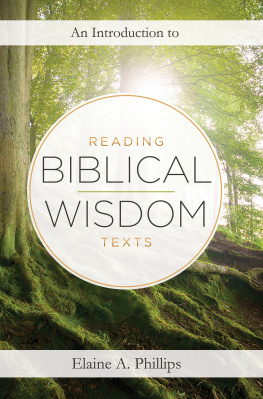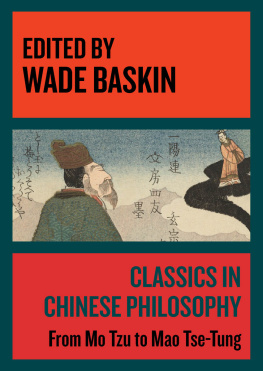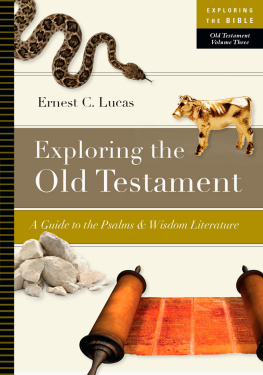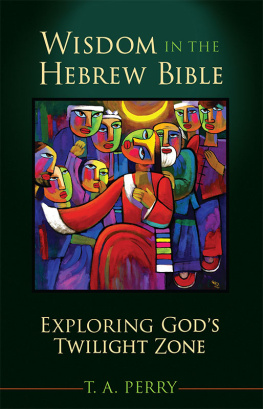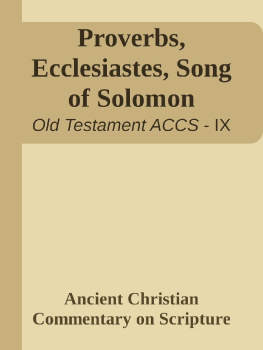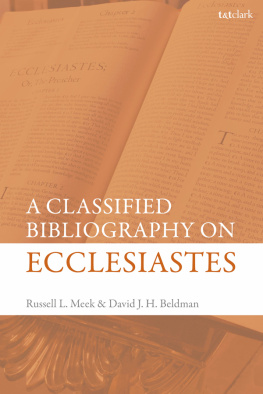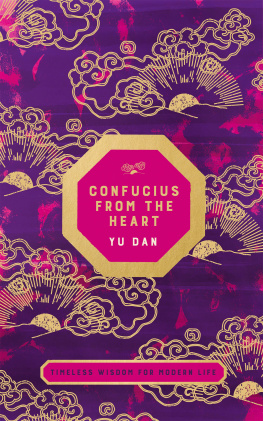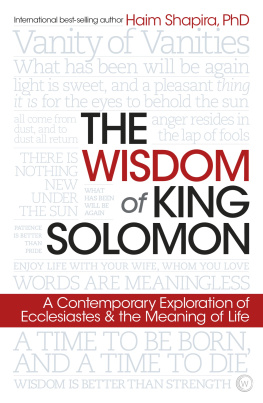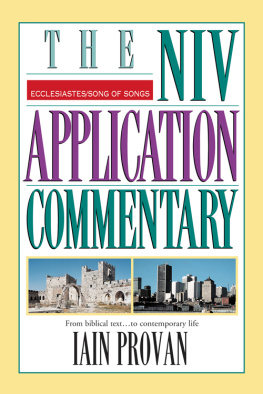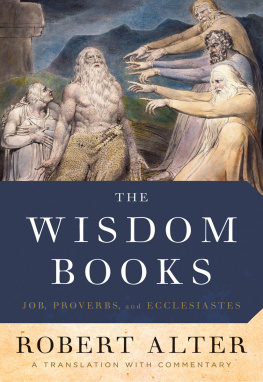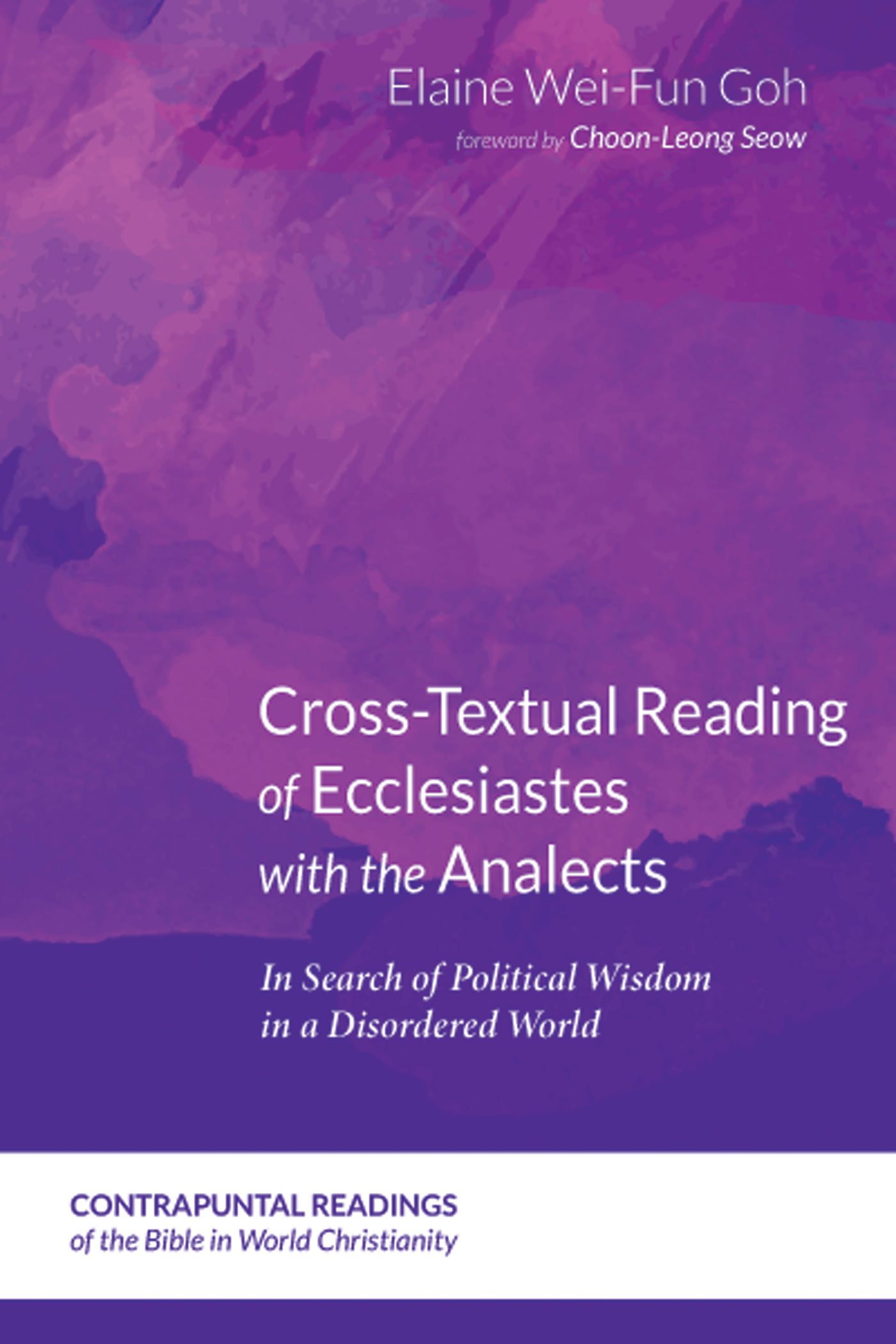Contrapuntal Readings of the Bible in World Christianity
Series Editors: K. K. Yeo, Melanie Baffes
Just as God knows no boundaries and incarnation happens in shared space, truth does not respect borders and its expression in various contexts is kaleidoscopic. As Gods church is birthed forth from local cultures, it is called into a catholic communitynamely world Christianity. This series values the twofold identity of biblical interpretations that seek to engage in contextual theology and, at the same time, become part of a global and many-voiced conversation for the sake of mutual understanding. By promoting contrapuntal readings that hold contextual and global biblical hermeneutics in tension, this series celebrates interpretations in three movements: () those based on the biblical text that honor multiple and interacting worldviews (reading the world biblically/theologically); () those that work at the translatability of the biblical text to uphold various dynamic vernaculars and faithful hermeneutics for the world (reading the Bible/theology contextually); and () those that respect the cross-cultural and shifting contexts in which faithful communities are embedded, and embody, real-life issues.
International Advisory Board
Walter Brueggemann, William Marcellus McPheeters Professor Emeritus of Old Testament at Columbia Theological Seminary (U.S.)
Adela Yarbro Collins, Buckingham Professor of New Testament Criticism and Interpretation, Yale Divinity School (U.S.)
Kathy Ehrensperger, Research Professor of New Testament in Jewish Perspective, University of Potsdam (Germany)
Justo L. Gonzlez, Emeritus Professor of Historical Theology, Candler School of Theology, Emory University (U.S.)
Richard A. Horsley, Distinguished Professor of Liberal Arts and the Study of Religion Emeritus, University of MassachusettsBoston (U.S.)
Robert Jewett, Emeritus Professor of New Testament at Heidelberg University (Germany)
Peter Lampe, Professor of New Testament Theology, Heidelberg University (Germany)
Tremper Longman III, Robert H. Gundry Professor Emeritus of Biblical Studies, Westmont College (U.S.)
Daniel Patte, Professor Emeritus of Religious Studies, New Testament, and Christianity, Vanderbilt University (U.S.)
Volumes in the Series ( 2018 2019 )
Volume : Text and Context: Vernacular Approaches to the Bible in Global Christianity, edited by Melanie Baffes
Volume : What Has Jerusalem to Do with Beijing? Biblical Interpretation from a Chinese Perspective (Twentieth Anniversary Edition), K. K. Yeo
Volume : Chinese Biblical Anthropology: Persons and Ideas in the Old Testament and in Modern Chinese Literature, Cao Jian
Volume : Cross-textual Reading of Ecclesiastes with Analects: In Search of Political Wisdom in a Disordered World, Elaine Wei-Fun Goh
Cross-Textual Reading of Ecclesiastes with the Analects
In Search of Political Wisdom in a Disordered World
Elaine Wei-Fun Goh
Foreword by Choon-Leong Seow
Foreword
T here is probably no book in the Bible whose authority is as frequently called into question as Ecclesiastes. Its place as a document of the community of faith was disputed from the start. The rabbis of antiquity sought to remove it from circulation, partly because it seemed to be internally inconsistent and partly because they feared it might lead to heresy. Even though it did win approval as an inspired work at the famous gathering of rabbis at Jamnia in CE, questions about its suitability for the general public continued to be raised for centuries thereafter. So Jerome reported in the fourth century that there were still some who tried to suppress it in his time. In the modern period, too, the book is more often than not viewed as one that stands at the periphery of the canon, at best a voice of protest.
Scholarly debates have continued to revolve around the tensions within the book and its apparent heterodoxy, and assessments of it have remained wildly contrastive. One interpreter argues that the authorknown by his Hebrew pen-name, Qohelethwas a depressed workaholic, while another calls him a preacher of joy. A majority of commentators regard the author as an unrelenting pessimist, constantly proclaiming that all is vanity (:), while others portray him as an unflappable optimist, who maintains that there is nothing better for people under the sun than to eat and drink and be merry (:). To explain the teachings of the book that seem idiosyncratic in light of the rest of the Bible, critics have argued that the author was influenced by skeptical traditions from Mesopotamia or Egypt or that his thoughts were shaped by various Greek philosophical schools. His perspectives are usually accounted for in terms of his intellectual backgroundmost notably the putative foreign influencesor his personal disposition and predilection. Thus, Qoheleth is said to have been either a pessimist or an optimist because of his training and/or simply because that was the way he was.
For all its difficulty, Ecclesiastes, especially in its opening poem about the cyclical nature of the world and its element (:), seems to resonate for many Asians. In fact, at the end of the nineteenth century, a scholar by the name of Emile Joseph Dillon found so many similarities between Ecclesiastes and Buddhism that he argued that Ecclesiastes reflects a Buddhist influence. That theory is far-fetched, and hardly any scholar has followed Dillons lead. Still, it is true that in Ecclesiastes, many Asian Christians will find much that is relevant, even inspiring.
In this book, Dr. Elaine Wei-Fun Goh introduces Chinese readers to the fascinating book of Ecclesiastes and its message for Asian Christians today. Dr. Gohs interpretation is deep and meaningful, for it is informed by the ancient world from which Ecclesiastes emerged. She draws on similar texts from elsewhere in the ancient Near East, and she reads the book against its sociohistorical backgrounda world of economic and political uncertainty that in some ways we find similar to our own world. Additionally, Dr. Goh brings Ecclesiastes to life for Asians by reading it cross-culturally, bringing the biblical text into conversation with classic Chinese literature. The result is a rich and exciting introduction to one of the best kept secrets of Old Testament Theology.
Choon-Leong Seow
Vanderbilt University
December , 2018
Acknowledgments
M any people have played a part in the completion of this book. I am grateful to them for journeying with me during my doctoral pursuit and, subsequently, in the writing of this volume.
I wish to thank my academic advisor, Dr. Choon-Leong Seow, who is my mentor in biblical Wisdom Literature. He is a careful exegete and an exceptional scholar. He taught me Ecclesiastes, along with other Old Testament books, during my pursuit of the master of theology degree at Princeton Theological Seminary. Many thanks to him for encouraging me to search deeper in Ecclesiastes and to venture into cross-textual endeavor. His teaching and his commitment to Old Testament scholarship are qualities I seek to emulate.
In addition, I am grateful to Dr. Pan Chao Wee, Dr. Archie C. C. Lee, and Dr. Daniel See You Lay, who have sharpened my thoughts and arguments in many ways during my doctoral studies. I am learning to keep up with their proficiency in reading Chinese Classics in parallel with biblical texts. They have kindly affirmed my endeavor in cross-textual hermeneutics and, at the same time, have honestly challenged my ideas. Their critical comments on my research have certainly helped this book progress in a more constructive direction.


